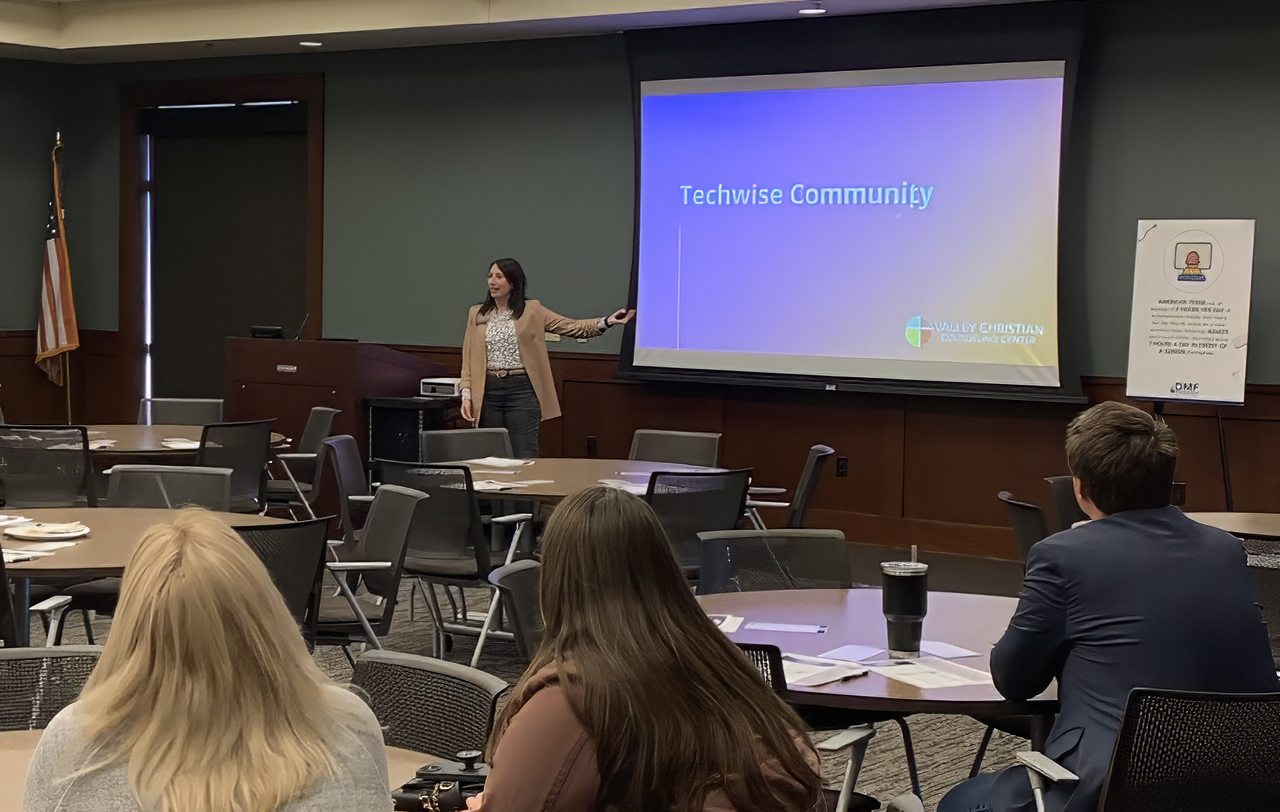


Digital Screen Use: A Dangerous Drug
Crystal Dunham exposed the dangers of digital screen time as part of the Healthy Technology For A Techwise Community Training series hosted by Valley Christian Counseling Center and Dakota Medical Foundation on Monday, October 23rd, 2023. The Matto Foundation sponsors this training.
Why it matters:
Digital screen use creates a dopamine or pleasure-centered rush, similar to the effect of using an illicit drug, eating comfort food, or sexual activity – all to a degree. The dopamine released in our brains when using digital screens is connected to our mental health. More screen time → more dopamine → more effects on the brain such as rigid thinking • decreased self-control • shortened concentration • less sleep.
Connections to mental health:
- Social-Comparison Effect: Body image worsens due to comparing, and an increased risk of eating disorders can occur from seeing unrealistic body types.
- Social-Comparison Effect: Depression results when seeing others live “perfect” lives, leaving a person feeling like a failure and prone to self-loathing.
- Suicidal Ideation: Teens with more than 5 hours of screen time per day were 20% more likely to have suicidal ideation than those using screens less than 1 hour per day.
- Suicidal Ideation: 6% of social media users traced thoughts of suicide back to their social media use.
- Social Imitation: Individuals imitate behavior they see in viral, unhealthy, and dangerous trends shared on social media.
Digital addiction:
The more time individuals spend on digital screens, the more dopamine is released in their brains. As dopamine is released, the gray matter in the frontal cortex, which controls logic and impulses, is reduced, making it challenging to stop screen use and can result in digital addiction.
How to help:
- Hold off giving children digital screens
- Role-model healthy technology behaviors
- Plan free-time away from digital screens
- Track screen time
- Stay active
- Get outside
- Develop recreational activities and hobbies
Screen time by the numbers:
- Kids (ages 8-12 years): 5.5 hours per day
- Teens (ages 13-18 years): 8.5 hours per day
- Adults (ages >18 years): 9 hours per day • 11 hours per day if you count listening to music
- “Excessive Screen Time Linked to Suicide Risk.” Science Daily, November 30, 2021.
- Kardaras, N. (2022) Digital Madness: How Social Media Is Driving Our Mental Health Crisis–and How to Restore Our Sanity. St. Martins Press
- M.J. Koepp et al., “Evidence for Striatal Dopamine Release During a Video Game,” Nature, 393 (May 21, 1998): 266-268.
- Murrow, D. (2020) Drowning in Screen Time: A Lifeline for Adults, Parents, Teachers, and Ministers Who Want to Reclaim Their Real Lives. Salem Books
- NIDA. 2022, March 22. Drugs and the Brain. Retrieved from https://nida.nih.gov/publications/drugs-brains-behavior-science-addiction/drugs-brain on 2023, October 3
- Nielsen Media Research. (2018, July). Time Flies: U.S. Adults Now Spend Nearly Half a Day Interacting with Media. https://www.nielsen.com/insights/2018/time-flies-us-adults-now-spend-nearly-half-a-day-interacting-with-media/
- Pew Research Center, November 2022, “Connection, Creativity and Drama: Teen Life on Social Media in 2022”
- Recreational Screen Time Behaviors during the COVID-19 Pandemic in the U.S.: A Mixed-Methods Study among a Diverse Population-Based Sample of Emerging Adults Int J Environ Res Public Health. 2021 May; 18(9): 4613.Published online 2021 Apr 27. doi: 10.3390/ijerph18094613 https://www.ncbi.nlm.nih.gov/pmc/articles/PMC8123581/
- Rideout, V., Peebles, A., Mann, S., & Robb, M. B. (2022). Common Sense census: Media use by tweens and teens, 2021.San Francisco, CA: Common Sense.
- Takahashi I, Obara T, Ishikuro M, et al. Screen Time at Age 1 Year and Communication and Problem-Solving Developmental Delay at 2 and 4 Years. JAMA Pediatr. Published online August 21, 2023. doi:10.1001/jamapediatrics.2023.3057
Take the Phones Down ▾ Heads Up Challenge
DMF Summit Resources
NEED HELP?
Local Resources
If you or someone you know is has suicidal thoughts or is in urgent need of mental health care, call 9-1-1 or 9-8-8 immediately.
For local organizations near you, please refer to the list of contacts below:
National Suicide Hotline
800-273-8255
FirstLink
2-1-1
The Village Family Service Center
701-451-4900
Valley Christian Counseling Center
701-232-6224
Justin’s Break the Silence
701-271-0263
American Foundation for Suicide Prevention
701-371-1194


